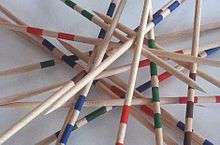Pick-up sticks

Pick-up sticks or pick-a-stick is a game of physical and mental skill in which a bundle of "sticks", between 8 and 20 centimeters long, are dropped as a loose bunch onto a table top, jumbling into a random pile. Each player in turn tries to remove a stick from the pile without disturbing any of the others. The game has several versions such as Jackstraws (or Jack Straws), Spellicans, and Spillikins, and appears in a line of a nursery rhyme: "...five, six, pick-up sticks!"
The sticks may be made of almost any material, such as ivory, bone, wood, bamboo, straw, reed, rush, yarrow, or plastics. Some Haida First Nation pick-up sticks are plain maple wood decorated with abalone shell and copper.
Today, the most common pick-up sticks game is Mikado.
Play
The object of the game is to pick up the most sticks.
To begin the game, a bundle of sticks is somewhat randomly distributed so that they end up in a tangled pile. The more tangled the resulting (dis)array, the more challenging the game. In some versions of the game, any isolated sticks, or sticks lying alone, are removed.
The players attempt to remove a single stick, without moving any other stick. In some versions of the game, players use a tool to move the stick away from the pile; this "tool" may be one of the sticks, held aside before the game begins. In other versions, players must pick up the sticks by hand. In either case, players must not move any other things while attempting to remove the said stick; if any other stick moves, his turn ends immediately and he loses a turn. Players who successfully pick up a stick can then have another turn; the player keeps removing sticks until he causes a secondary stick to move.
The game is over when the last stick is removed. The winner is the player with the highest number of sticks picked up.
In some versions of the game, different-coloured sticks are worth different numbers of points, and the winner is the person with the highest score.
Jackstraws or Jack Straws
The pieces in a jackstraw set are often thematically related to farmyard tools, such as ladders, rakes, shovels, and hoes. There are typically around 45 pieces in a set and made of wood, plastic, bone, or ivory. In addition to the jackstraws themselves, the game typically includes a helper piece with a hooked edge to help people grasp and manipulate pieces. Each piece in the game also has a point value, with more challenging pieces being worth more points at the end of the game.
Equipment
- 1 hook
- approx 45 jackstraws
Object
Players try to win points by removing jackstraws – in the shapes of various tools – from the pile, one at a time.
Rules
- If you're the first player, hold all the jackstraws about 5 centimetres from the table. Then drop them so that they fall into a pile.
- Using the hook, try to remove jackstraws from the pile, one at a time without moving the others at all. If any jackstraws have fallen free from the pile, you may remove them first. Each time you succeed in removing one, keep it and try to remove another. Once you've started to remove a jackstraw, you can't change your mind and decide to remove another. If, at any time, you wish to use your fingers instead of the hook, you may do so.
- If you move one or more jackstraws while you're trying to remove another, you must end your turn. That's why players should watch each opponent's turn very closely!
- When your turn ends, the next player picks up and drops the remaining jackstraws and plays in the same manner.
You can also just start playing from where you left off without dropping the jackstraws again.
- Continue playing until all the jackstraws are gone from the pile
Winning
At the end of the game, players total the point values of their jackstraws. The players with the most points wins.
Scoring
Score 10 points each – Two-man saw, Gun, Wrench, Ladder, Key-hole saw Score 5 points each – Shovel, Rake, Sledge, Fork, T-Square, Paddle, Axe, Crutch, Sword Score 2 points each - Cane, Arrow, Tamper, Baton, Hockey Stick, Pick Score 2 point each - all other pieces.
Other games
- Jenga - In this game, short blocks of wood (1.5 × 2.5 × 7.5 cm) are stacked in a tower. Individual blocks must be removed without causing the tower to fall.
- Blockhead! - Players take turns stacking irregularly shaped wooden blocks on each other until the tower of blocks collapses during the loser's final turn.